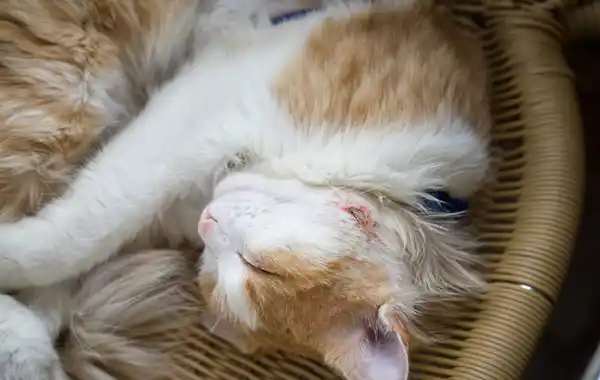Spring is when most cats peel themselves away from their favourite radiator to spend more time outdoors.
As winter ceasefires end, territorial disputes between neighbouring cats and wandering strays resume. If you live in a densely populated area, your cat is more likely to be involved in a fight. But even in the countryside, where territories are bigger and further apart, cat battles can be fierce. Your cat may be lucky and escape a fight with only a few scratches, ruffled fur, or damaged pride. However, if your cat has a bite wound, more serious illness can develop.
What is a cat-bite abscess?
Cats’ mouths contain a mixing pot of harmful bacteria. When cats bite each other, these bacteria inoculate (push) through the skin into deeper layers of body tissue. Infection develops as your cat’s immune system battles against the bacteria.
The tissue around the bite wound produces pus (a mixture of white blood cells and bacteria) causing fluid-filled swellings under your cat’s skin. These ‘pus-pockets’ are called abscesses and appear as painful lumps on your cat’s body).
What are the signs to look out for?
Small punctures in the skin heal over quickly; even if your cat has a bite wound, you might not notice straight away. Cats with defensive bite wounds to their paws might limp or seem stiff. Over the following days, as an abscess develops, your cat might:
● Become lethargic.
● Have a reduced appetite.
● Growl and lash out when you touch their back.
● Have painful swellings around their face, neck, or back.
● Often, the first noticeable sign of a cat-bite abscess is when it bursts and your cat’s fur becomes sticky with a blood-tinged, smelly liquid.
What treatments are available?
Your vet will thoroughly check your cat for other injuries and measure their temperature. If the abscess has burst, your vet may prescribe pain killers and a course of antibiotics. For large abscesses, your cat might also need an operation under anaesthetic to lance (cut open) the abscess and clean the surrounding tissue.
How can you prevent a cat-bite abscess?
● Neuter your cat before letting them go outdoors; entire cats roam and fight more.
● Agree a timetable with your (hopefully understanding) neighbours to limit the number of cats outside at any one time.
● Keep the cat flap in good working order; it’s an important escape route.
● Keep your cat’s vaccines up-to-date — Feline Leukaemia Virus (FeLV) is transmissible via cat bites.







